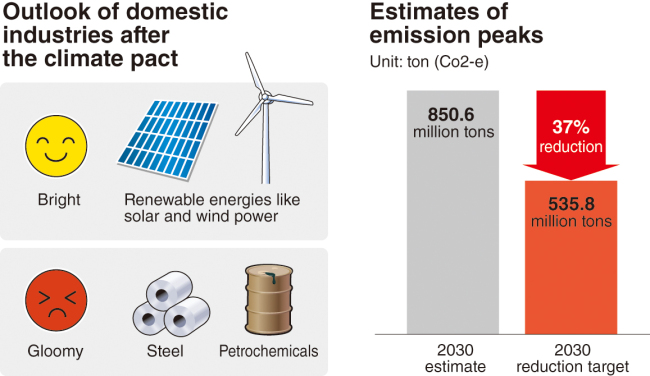The South Korean business community agreed on the inevitability of the new climate change pact for globally sustainable growth, but expressed concern over its impact on local industries.
Korea is among the world’s top 10 carbon emitters as 30 percent of the export-driven country’s businesses are based in manufacturing.
Under the new climate deal reached by world leaders last week, the Seoul government must develop a detailed road map to achieve its 2030 target of reducing greenhouse gas emissions by 37 percent from business-as-usual, or BAU, levels.
Big emitters in the private sector, including steelmakers and petrochemical companies, are closely watching the government’s upcoming policy direction.
“Korea’s 2030 target is higher than Japan’s 26 percent,” an official from a local major steelmaker said.

The Korea Iron & Steel Association said the new climate deal is likely to be another threat to the steel industry, which has already dragged on for years by a continued fall in global demand and oversupply of cheap Chinese products.
“The government should take its policy impact on competitiveness of an industry seriously when it sets its greenhouse gas reduction target by business,” said Nam Jeon-im from the association.
Some manufacturers focused on new business opportunities like the green car business in preparation for the post-fossil fuel era.
“Despite new opportunities in the green economy, it will take a while for energy-poor Korea and Korean manufacturers to turn those opportunities viable ones,” said No Jae-sung from the Korea Chamber of Commerce and Industries, the nation’s largest business association.
On the effect of the climate deal on the nation’s energy mix, he forecast the government would consider raising its dependency on nuclear energy to cut the use of fossil fuel-based energy sources.
But Korea has faced difficulties in shifting to renewable energy sources like solar power due to its lack of land available for additional energy facility installments.
The level of dependency on nuclear energy for electricity generation is not low. As of 2015, nuclear energy provides approximately one-third of Korea’s total electricity.
“Korea has a plan to complete 11 new nuclear power plants by 2024, but it is not an easy task, considering the strong resistance from citizens who want a nuclear plant-free nation,” No of the KCCI said.
Manufacturers are paying attention to the reactions of the energy and environment ministries to the Paris climate agreement.
The global deal calls for developed and developing nations to work toward reducing gas emissions by 40 percent to 70 percent by 2050 compared to 2010 levels. Korea has no choice but to reform its industrial structure to meet the global demand, the KCCI official said.
By Seo Jee-yeon (jyseo@heraldcorp.com)



